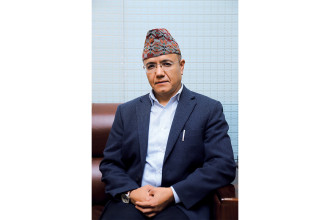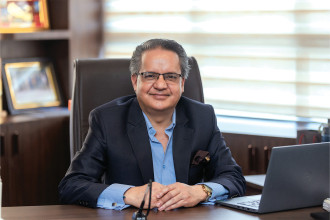
Binay Khadka
Chief Executive Officer, Khalti
Led by the young and dynamic Binay Khadka as its Chief Executive Officer, Khalti has become a prominent digital payment solution provider in Nepal in recent days. As the head of the company, Khadka is responsible for the overall management besides setting a vision to guide the company five years down the line. Khadka says that his role is not just about running the organisation or profitability but also about aligning the vision of the employees with that of the company. Prior to joining Khalti, he was engaged in the digital ecosystem of the banking industry which, he says, has helped in meeting his new responsibilities. Khadka shares that ever since his student days he has had a keen interest in trying to merge finance and the digital ecosystem. He informs many people may not know that Khalti digital wallet is just a brand name and that the legal name of the company is actually Sparrow Pay Pvt Ltd. The concept of digital wallets started gaining prominence in Nepal about six years ago and Khalti has been on the scene from the very beginning. With over two million customers, Khalti today is one of the leading payment gateways of the country and processes more than 150,000 transactions worth about Rs 150 million daily. In this edition of Business 360, we spoke to Khadka to learn what leadership means to him.What’s your definition of a leader?
A leader is someone who can influence and guide the people around them towards a common purpose and vision. There are various traits in between such as being empathetic, promoting meritocracy, etc.Is leadership inborn or acquired?
Leadership requires certain personality traits but this doesn’t mean it cannot be acquired. Let’s say that I am an introvert or prefer working alone, then it might be challenging for me to adapt to working with a team but I can always learn to do so. There isn’t anything that a person cannot learn or acquire. Life is all about adapting to the changing scenarios and moving ahead. There are some in-born personality traits, but obviously, traits you acquire while working with your mentors or colleagues are also influential.Who comes to your mind as an ideal leader?
For me, an ideal leader is only based on theory. There are various leaders who have influenced me but that was all situation-based. Some skills work let’s say during a pandemic, some during earthquakes, but working out ideas that are compatible with every obstacle and taking your team towards the pursuit of its purpose is someone who I think can be called an ideal leader. I have worked in three organisations and for me, all my prior leaders in those organisations were great, and that is why I am where I am today. I am more influenced on a personal level by the leadership of my mother. To be honest, mothers are true leaders as they make us feel secure and protect us at all costs. For me personally, my mother is an ideal leader, and professionally the various management leaders who have been leading their companies. For instance, the chiefs of eSewa and NIC Asia Bank where I was previously working have been role models for me.Could you share with us any incident that tested your leadership ability?
From the time we start our career, we are tested at different levels. The only difference I would say is the magnitude of the responsibility when compared to other leadership positions within the organisation. I too have faced some trying times but the one that has been really challenging yet very fulfilling was while I was working at NIC Asia Bank. It was not the work per se that was challenging. I was leading the digital team and everyone used to feel insecure because of the massive transactions that take place on a daily basis. Motivating my team members and making them feel comfortable with the work they were doing was a huge task. I had to constantly remind them that they are in safe hands and whatever we had been doing just needed to be done better. I had to perpetually keep telling them not to bother about what happens outside and only focus on what they were doing, and that I would handle any situation that is beyond them. That is when I realised that one of the major responsibilities of a leader is to instil confidence in your team and not allow them to sway from the purpose.
How important is it to have a good team to work with?
No matter where we work or in which position we are, we all need to understand that we cannot pursue anything alone; a team is very essential. When we work in a team, different mindsets come into play which help us reach our purpose. The core responsibility of a leader is to guide and nurture the team because if the team is not good then there will be little to no progress. For a leader to excel, a good team is of utmost importance.When should a leader hand over the leadership position?
There are a lot of people who assume that things cannot be done without them. Yes, they might be the focal person within the organisation but whatever the organisation may be – the working modalities may be different – but any organisation can and will run without that one individual. Personally, if I find the task is no more challenging or if I feel I need to move on to bigger things then I will hand over the reign of the current leadership position that I am holding. There could also be times when other team members can do the work you are doing in a much better way, and I think that is the moment you should start thinking about delegating and handing over your leadership position.What major changes has Covid 19 brought to the digital wallet business?
Though the Covid 19 pandemic hurt many people across the world it was a blessing in disguise for us. Prior to the pandemic, a lot of people were unaware and even those who knew about digital wallets were unwilling to adopt this mode of payment. Many people were concerned about security and cash was king. The pandemic, however, entirely changed this mindset and the socio-economic condition of Nepal, particularly in our industry. Once the lockdown started, we witnessed a steep spike in the growth of consumers, the numbers almost doubled, and that way it has helped us. Once you hop into this, you get addicted, and hence you tend to stay. I think the only positive thing to come out of Covid 19 was this boost to the digital economy.What are the changes you have brought after your appointment in the company?
After being appointed to lead the team, I have made some internal and external changes. On the partnership level, Khalti has opened up quite a bit. We have been working massively with various organisations and continue exploring various possibilities. We have been trying to transform Khalti into a lifestyle brand as well. Within the company, I have been trying to promote meritocracy and transparency. I believe people working in the organisation should be transparent with each other and all employees should be informed and made aware of whatever the company is doing. So, I have been trying to develop a sense of belongingness among our employees so that they are self-motivated to contribute beyond their capabilities. Our workforce has also increased by around 16% within the last six months and we have been rapidly increasing the transaction volume and customer acquisition as well. Khalti has also joined various other networks like Fonepay.What do you consider your most significant accomplishment as a leader?
I was one of the youngest, in fact, the youngest CEO in the fintech industry of the country when I joined Khalti. So, I think that in itself is an achievement because I am handling a company which has a turnover of more than Rs 1,000 crores. I am also happy with my progress because even without extraordinary academics I have been able to reach where I am through sheer persistence and passion. For me, learning from every failure and not letting it repeat is an accomplishment on its own. However, what I have to say is not exactly related to your question but what bothers me is the people who do not believe in young blood. There are several young leaders who have done amazing things across the world and it is time people recognise their accomplishments.How can a leader prepare for the unknown?
Unknown or unprecedented things can either be positive or negative. So, leaders have to be dynamic and they should not sway from their goals and purpose just because something they had not prepared for happens. They should rather tackle that issue according to the dynamics of the situation. A good leader should be able to predict to some extent. Who knew the fintech industry would ever get to this level. READ ALSO:
Published Date: June 1, 2022, 12:00 am
Post Comment
E-Magazine
RELATED Leadership





-(1)-1752214965.jpg)